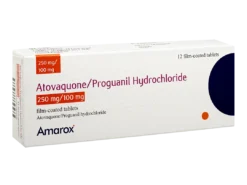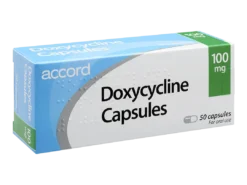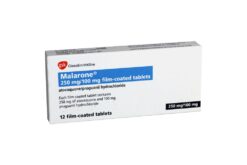What is Malaria?
Malaria is a serious infectious disease caused by parasites that are transmitted to humans through the bites of infected female mosquitoes. Once inside the body, these parasites travel to the liver, where they mature and multiply before re-entering the bloodstream and infecting red blood cells.
Malaria is most common in warm, tropical areas of the world, like parts of Africa, Asia, and South America. It’s a dangerous disease that can make you very ill if not treated quickly.
Why do I need to take anti malaria tablets?
Taking antimalarial tablets is very important if you’re travelling to places where malaria is common. These tablets help protect you from getting sick with malaria and work by stopping the malaria parasites from growing in your body if you get bitten by an infected mosquito.
Even though you might use mosquito sprays and nets, these aren’t always enough to keep you completely safe. Anti-malaria tablets give you extra protection and can prevent you from getting malaria or make the illness not as bad if you do catch it.
Symptoms of Malaria
Malaria symptoms usually appear 10 to 15 days after an infected mosquito bites you. The most common signs are:
- High fever
- Chills and shivering
- Sweating
- Headache
- Body aches
- Fatigue
- Nausea and vomiting
Some people may also have:
- Diarrhea
- Abdominal pain
- Cough
Malaria symptoms can be similar to flu symptoms at first, but if not treated quickly, it can become very serious and even life-threatening. If you’ve been to a country where malaria is common and you start feeling these symptoms, it’s important to see a doctor right away.
How to Prevent Malaria
Preventing malaria is really important, especially if you’re heading to areas where the disease is common. Here are some practical steps you can take to keep yourself safe:
- Take antimalarial tablets: Follow your doctor’s or pharmacist’s advice on when to start these medications and how long to continue them after your trip. They’re your first line of defence against the disease.
- Use insect repellent: Choose a repellent that contains DEET, like Jungle Formula Lotion, and apply it to any exposed skin. This is especially important during the evening and night when mosquitoes are most active.
- Dress wisely: Wearing long-sleeved shirts and long trousers can help protect your skin from bites.
- Sleep under a mosquito net: If you’re staying in areas where malaria is a risk, using a bed net treated with insecticide will keep mosquitoes away while you sleep.
- Choose where you stay carefully: Staying in places that have screens on windows or air conditioning can help keep mosquitoes out of your living space.
- Be mindful of timing: Try to limit outdoor activities during peak mosquito hours, which are usually from dusk until dawn.
- Use insecticide sprays or coils: These can help reduce the number of mosquitoes, making it safer for you.
How to Treat Malaria
If you think you have malaria, seek medical help right away. Malaria is a serious illness, but with quick treatment, most people make a full recovery.
The treatment for malaria will depend on the type of malaria parasite you have, the severity of your symptoms, your age, and whether you’re pregnant. Your doctor will determine the best treatment plan for you.
Typically, treatment involves taking anti-malarial medications like Doxycycline and Malarone, that work to kill the parasites in your blood. You might need to take a combination of different medications, and you must complete the full course as prescribed by your doctor or pharmacist, even if you start feeling better.
In severe cases, you may need to be hospitalised to receive intravenous medications and close monitoring. Some people might also require supportive treatments like fluids, oxygen, or blood transfusions.
How to Take Malaria Tablets
If you’re taking tablets for malaria prevention:
- Begin taking your malaria tablets as prescribed, which could be 1-2 days or up to 2 weeks before travel. Some tablets need to be taken daily, others weekly, so set a reminder to help you remember.
- You might experience headaches, nausea, or diarrhoea, especially in the first few days. These are usually mild and often improve. Taking them with food can help reduce stomach upset.
- Keep taking your tablets as directed throughout your stay in the malaria-risk area. Whilst you’re away, some tablets, like doxycycline, can make your skin more sensitive to sunlight. Use suncream and avoid spending too much time in the direct sunlight.
- Depending on the medication, you’ll need to continue taking the tablets for 7 days to 4 weeks after leaving the malaria-risk area.
Don’t stop taking your tablets early, even if you’re feeling fine, as completing the full course will effectively protect you against malaria.
If you’ve been diagnosed with malaria, the way you take your medication will depend on the specific treatment prescribed by your doctor.














